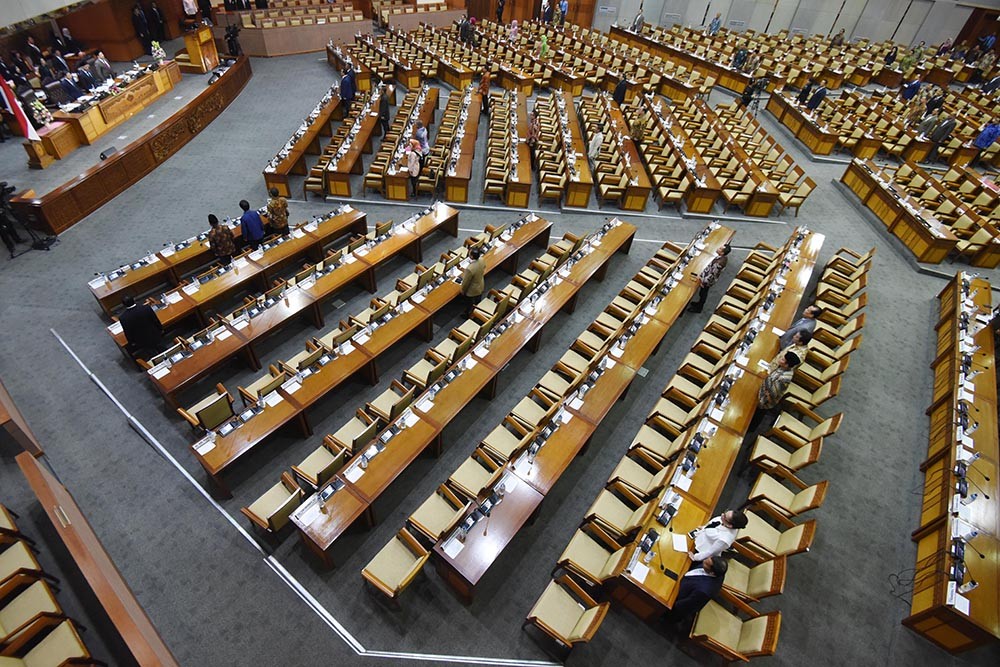Popular Reads
Top Results
Can't find what you're looking for?
View all search resultsPopular Reads
Top Results
Can't find what you're looking for?
View all search resultsHouse, politicians tighten grip on financial sector in new omnibus bill
The bill allows lawmakers to wholly own the leadership selection process of the Financial Services Authority (OJK) and Deposit Insurance Corporation (LPS), as seen in revised Article 11 of the OJK Law and Article 65 of the LPS Law, meaning the changes would remove the involvement of the government and Bank Indonesia (BI) and, in the case of the current process for the OJK, also eliminating participation from the public.
Change text size
Gift Premium Articles
to Anyone
A
new omnibus bill is poised to pave the way for politicians and lawmakers to tighten their grip on authorities in the financial industry, raising concerns among experts and professionals that it could undermine governance of the sector.
The bill, named the financial sector development and strengthening (PPSK) bill, was initiated by the House of Representatives back in 2020. Lawmakers finalized the draft in September and will begin discussing it with the government next month.
The bill allows lawmakers to wholly own the leadership selection process of the Financial Services Authority (OJK) and Deposit Insurance Corporation (LPS), as seen in revised Article 11 of the OJK Law and Article 65 of the LPS Law, meaning the changes would remove the involvement of the government and Bank Indonesia (BI) and, in the case of the current process for the OJK, also eliminating participation from the public.
Revised Article 67 on the LPS selection process erases a ban that prevents political party leadership from entering the LPS candidacy, expanding a similar move that lawmakers made on the central bank in a 2004 revision of the BI Law, which removed a ban of both members and leaders of political parties.
The bill also introduces a supervisory body for both the OJK and the LPS with its five members being elected by lawmakers and will act as their arm to oversee those agencies. Previously, the body was created only for BI under the 2004 law.
“I see the House really wants to take over. That’s a big difference in this bill. The political tones get more intense as well,” financial-sector expert Manggi Taruna Habi, who has held positions in notable financial institutions, told The Jakarta Post on Monday.
Read also: Explainer: Financial system bill heralds changes from crypto to BI
Manggi elaborated that the changes in the selection process might chip away at important “checks and balances”, which are needed to ensure that the positions are held by the right people.
He also warned that the changes could risk the elected officials becoming politically influenced, as they could be pressured to follow what lawmakers want, which are often populist measures to appeal to their voters.
“The financial sector often needs [to make] unpopular policy [moves], which will be complicated if political interests intervene. The decision often involves swallowing a bitter pill and you have to do it,” Manggi said.
Experts are also concerned that the selection process of the OJK and the LPS would become more transactional, as they would only rely on the House instead of being balanced with people from the executive branch. Many fear that it would make it easier for members of political parties to enter the candidacy.
Jakarta State University professor Haryo Kuncoro criticized lawmakers for retaining, even expanding, the removal of a ban for members or leadership of political parties to enter the candidacy of the institutions, arguing it would make more room for people in charge of those institutions to become partisan.
He told the Post on Oct. 15 that the design of the bill could expose BI, the OJK and the LPS to much political influence and paved the way for the House to tighten its grip on the institutions with the risk of disrupting the independence of those institutions.
Bhima Yudhistira, executive director of the Center of Economic and Law Studies (CELIOS) urged lawmakers to keep the institutions free from political influence, arguing it was worth it to prevent misdeeds from happening.
For instance, the LPS is responsible for releasing money in the event of troubled banks needing to be bailed out, which requires a professional to make the assessment and decision on which banks are to receive aid so the money is not leaked to the wrong people, as has happened in several historic cases, he said.
“This bill actually offers promising reform to our financial sector. It will be a shame if it's littered with political maneuvers. It may undermine the trust of investors and the market,” Bhima told the Post on Wednesday.
Article 41 in the revised BI Law extends the maximum serving period of the central bank’s board of governors to three years, one year longer than the prevailing rule.
Bhima said the extension was unnecessary, arguing that it risked hampering the pace needed to make sure that monetary policy was up to the most recent challenges, even putting it at risk of lagging behind.
Jakarta State University’s Haryo added that it raised concerns over disruption to the political cycle, as well as the possibility that it would be replicated in other institutions like the presidency.
BI has remained mum over the bill, while the OJK noted it was studying the changes and would provide feedback to the House, alongside the government. Meanwhile, the LPS stated it was ready to receive new mandates if the bill was passed.
Read also: Political goals control Indonesia’s sovereign wealth fund
Amir Uskara, deputy chair of Commission XI, which oversees financial institutions and the state budget, said on Tuesday that there was nothing wrong with shifting the selection process of the OJK and the LPS wholly to the House, adding it would create more transparency for the public. He also assured that the bill had been formulated according to best practices.
On easing the rules so members of political parties could apply for candidacy, lawmakers want to give equal chance to all possible candidates regardless of their background as long as they have the competence, he said, adding any possible conflict of interest could be minimized with the many other existing regulations.
“The current draft you see today will still be discussed further with the government,” Amir added, implying that it was not yet final and may be subject to change.










